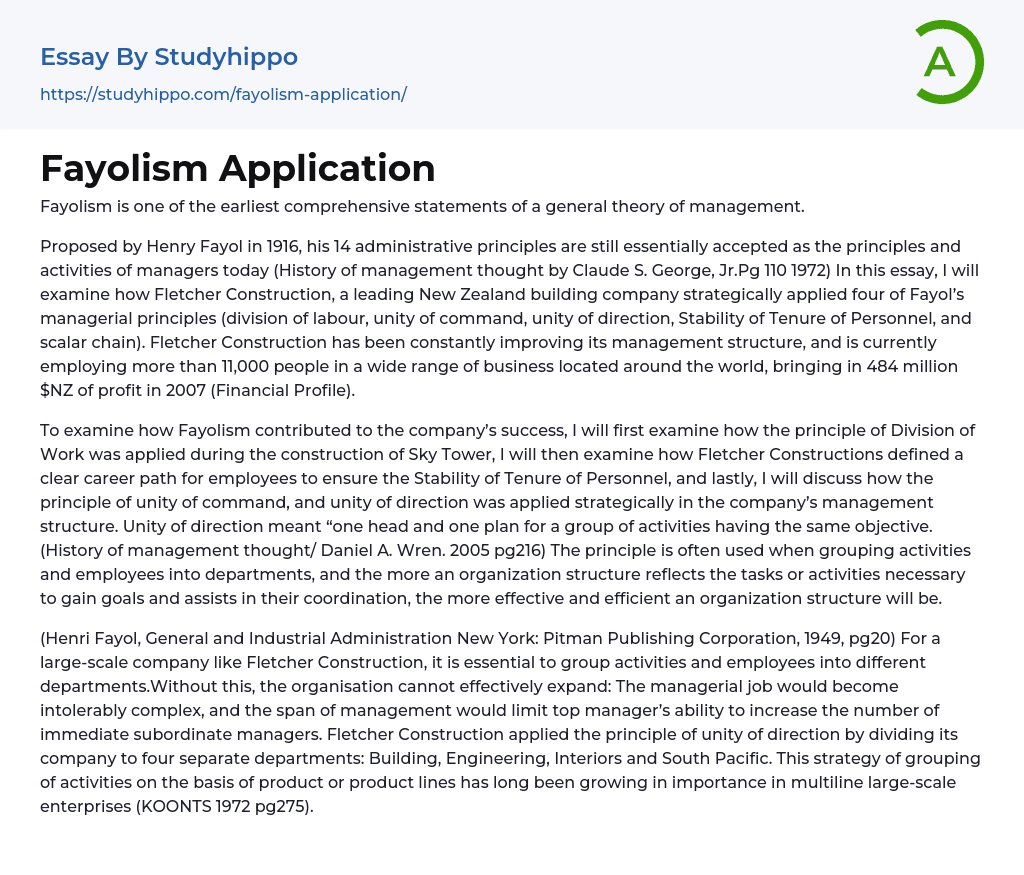Fayolism was an initial and comprehensive statement of a broader management theory.
Henry Fayol introduced his 14 administrative principles in 1916 and they continue to be widely accepted as guiding practices for managers today as noted by Claude S. George, Jr. in "History of management thought" (Pg. 110, 1972). This essay focuses on how Fletcher Construction, a prominent building company in New Zealand, strategically implemented four of Fayol's managerial principles: division of labor, unity of command, unity of direction, and stability of tenure of personnel while maintaining a scalar chain. Fletcher Construction's management structure has been consistently improving and the company now employs over 11,000 individuals across various global business ventures, generating a profit of 484 million $NZ in 2007 according to Financial Profile.
The contribution of Fayolism to the success of the company will be analyzed through various
...principles. Firstly, the application of the principle of Division of Work during the construction of Sky Tower will be examined. Secondly, Fletcher Constructions' implementation of a clear career path for employees will ensure Stability of Tenure of Personnel. Lastly, the strategic application of the principle of unity of command and direction in the company's management structure will be discussed. As stated in the History of Management Thought by Daniel A. Wren (2005 pg216), unity of direction implies having "one head and one plan for a group of activities having the same objective". This principle is commonly used when organizing activities and personnel into departments, and greater alignment between an organization's structure, tasks or activities required to achieve objectives, and coordination efforts will lead to more effective and efficient results.
(Henri Fayol, General and Industrial Administration New York: Pitman Publishin
Corporation, 1949, pg20) For a company as large as Fletcher Construction, it is crucial to categorize activities and staff into distinct departments. The absence of this would hinder the company's ability to expand efficiently. The managerial role would become overwhelming, and the scope of management would restrict the top managers' capacity to add new subordinate managers. To achieve unity of direction, Fletcher Construction separated its organization into four distinct departments: Building, Engineering, Interiors, and South Pacific. This tactic of organizing activities based on products or product lines has been increasingly significant among multi-line large-scale enterprises (KOONTS 1972 pg275).
- Being A Leader essays
- Servant Leadership essays
- Leadership Experience essays
- Leadership Qualities essays
- John Locke essays
- 9/11 essays
- A Good Teacher essays
- A Healthy Diet essays
- A Modest Proposal essays
- A&P essays
- Academic Achievement essays
- Achievement essays
- Achieving goals essays
- Admission essays
- Advantages And Disadvantages Of Internet essays
- Alcoholic drinks essays
- Ammonia essays
- Analytical essays
- Ancient Olympic Games essays
- APA essays
- Arabian Peninsula essays
- Argument essays
- Argumentative essays
- Art essays
- Atlantic Ocean essays
- Auto-ethnography essays
- Autobiography essays
- Ballad essays
- Batman essays
- Binge Eating essays
- Black Power Movement essays
- Blogger essays
- Body Mass Index essays
- Book I Want a Wife essays
- Boycott essays
- Breastfeeding essays
- Bulimia Nervosa essays
- Business essays
- Business Process essays
- Canterbury essays
- Carbonate essays
- Catalina de Erauso essays
- Cause and Effect essays
- Cesar Chavez essays
- Character Analysis essays
- Chemical Compound essays
- Chemical Element essays
- Chemical Substance essays
- Cherokee essays
- Cherry essays




